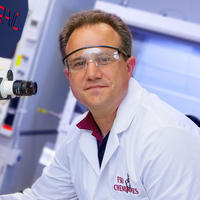Florida State receives $10 million for nuclear research center
Florida State University will receive $10 million from the U.S. Department of Energy to create a new Energy Frontier Research Center that will focus on accelerating scientific efforts needed to support nuclear waste cleanup.

Thomas Albrecht-Schmitt,
the Gregory R. Choppin
Professor of Chemistry
at FSU
The center will focus on developing technologies for recycling nuclear fuel and cleaning up Cold War-era weapon production sites. It will be led by Thomas Albrecht-Schmitt, the Gregory R. Choppin Professor of Chemistry at FSU.
“Science underpins every mission of the Department of Energy,” said Cherry Murray, director of the Department of Energy's Office of Science. “These new Energy Frontier Research Centers will provide a foundation of basic science for a top priority of DOE — tackling environmental cleanup of hazardous waste from nuclear weapons research and production. “These projects bring together talent and leadership from top scientists to solve problems through scientific discovery.”
Albrecht-Schmitt specializes in radiochemistry and researches some of the least understood elements of the periodic table that are part of what’s called the actinide series. His most recent work has been exploring the uses and underlying chemistry of the elements californium and berkelium, which are man-made elements that exist in extremely small quantities but are highly radioactive.
“I’m ecstatic that they have chosen FSU for a new center,” Albrecht-Schmitt said. “When I came here, my goal was to make us a force in radiochemistry, and I think with this award, it shows we have accomplished that goal.”
The grant will support 10 graduate students and seven postdoctoral researchers at FSU.
Albrecht-Schmitt’s lab is a novelty in the world of university science. His chemistry lab is specifically designed to handle radioactive elements such as californium or berkelium, making it the only university lab in the country equipped to do so. Because of this, the Department of Energy has worked with him extensively on research that illuminates the far regions of the periodic table.
“We are thrilled that the Department of Energy has chosen Professor Albrecht-Schmitt and FSU to be the home of a new Energy Frontier Research Center,” said Vice President for Research. “The award reflects not only on his groundbreaking research thus far, but his ability to move the field of chemistry forward in the years to come, providing solutions to some of the world’s most complex energy problems.”
Three other institutions will also host research centers. They are Ohio State University, the University of South Carolina and the DOE’s Pacific Northwest National Laboratory.
Albrecht-Schmitt received his doctoral degree in 1997 from Northwestern University and taught at Auburn University and the University of Notre Dame before coming to Florida State in 2012. He holds an endowed professorship in honor of Gregory R. Choppin, the late nuclear chemist who co-discovered the element mendelevium, atomic number 101.
WHAT THEY'RE SAYING:
Sam Huckaba, dean of the College of Arts and Sciences
“With the center, FSU becomes an unquestioned leader in actinide research, and I applaud Tom on such a spectacular success. The competition for these types of awards is brutal, as it should be for such a significant level of funding, and Tom has proven that his work is worthy of such a huge investment by the Department of Energy.”
Tim Logan, chair of the Department of Chemistry and Biochemistry
“This is a recognition of the world-class research in actinide chemistry that is going on here at Florida State. The award recognizes the groundbreaking research Tom has done and is a great opportunity for our department and the university as a whole.”

